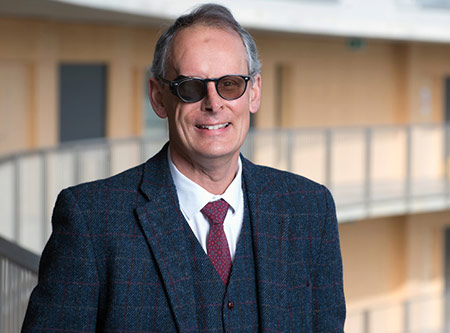Portrait
Giorgio Zanetti, along with Benoît Frund, embodies continuity with the previous Rectorate. His desire and the "great pleasure" he takes in pursuing his work on teaching coincides with the Rector’s thinking: both felt that "replacing an entire team with no element of continuity was a pointless risk," explains the vice-rector. As a full professor in medicine and a specialist in clinical infectiology, the use of antibiotics and the epidemiology of infectious diseases, he is aware of the irony: "I left my professional activities to join the Rectorate and the problem caught up with me."
At the age of 59, he knows how to "talk to people from diverse backgrounds" and enjoys it, but insists on modesty in the face of a pandemic of the kind we are dealing with: "I dare to believe that being in my field of knowledge has helped me to share certain keys to interpreting the event with other people and take advantage of professional relationships that have been useful to managing UNIL during this period, to gauge and validate our decisions; but managing an institution is not about managing the health problem itself." He talks not only about continuity but also renewal, to "improve the learning experience of our students in all their diversity". He recalls, for example, in terms of societal needs, that UNIL’s digital policy was based on two pillars, namely learning about, and through, digital technology. The second of these has soared since January 2020. "We will need to learn lessons from what we found out working under restrictions in a remarkably resilient institution, but also restore a university life that is enhanced by all its community, interdisciplinary and mutually supportive aspects; contact with others is essential, because that’s when skills are truly passed on and acquired, regardless of all the opportunities provided by remote learning," he believes.
"For our graduates, the future will involve skills in using new technologies as well as an understanding of the societal issues associated with this revolution." He is keen to have detailed discussions with the various departments at UNIL, with specialists in pedagogy, in digital technology and teaching staff, as well as with students. "What do we want to retain from this experience, how do we want to incorporate technological tools into the teaching of the future, what opportunities do they offer in terms of flexibility and accessibility for young people in different situations, where is the added value, and what are the limitations?" asks Giorgio Zanetti, who is very aware of the issue of fatigue among staff and students who are operating in two modes, i.e. remotely and/or in person.
His department has contributed significantly to the continuation of university activities. The Social Affairs and Student Mobility department has had to deal with numerous requests for support from young people who have been deprived of financial support; mobility has declined, but not "the work done to offer something, at least". The Language Centre has also had to "show a great deal of agility", not to mention a department that is as essential as the Admissions Unit.
The Support Centre for Teaching "has played a huge role, which is recognised far beyond UNIL, in helping us to adapt to the situation". In terms of the evaluation of teaching by students, the system has proven highly effective in line with UNIL’s original intention, namely as a tool that is available to teaching staff to help them improve their teaching, not a system of surveillance and public reporting of their performance. "Some universities claim transparency, but you have to be careful of demagogy, because there are ways of keeping people happy and it’s not necessarily about quality," comments the vice-rector. "Teachers who deliver high-quality teaching know that they might challenge people’s thinking," he continues, keen to promote improvements in teaching on the basis of discussions and confidentiality.
His department’s activities clearly rely on its various units but also direct interaction and a special relationship with faculties, schools and the Federation of Students’ Associations (FAE). There is regular contact with certain teaching programmes, such as the colleges of science and humanities, in conjunction with EPFL, or the "Sciences Squared" programme led by the Rectorate.


